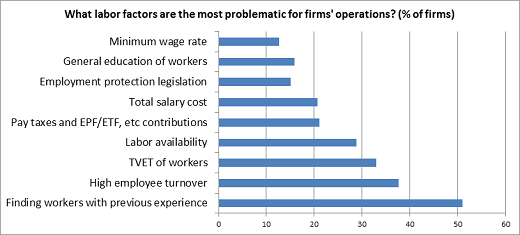The supply and demand for skills in Sri Lanka
Sri Lanka is gearing up to rise to the ranks of a Middle Income Country with a goal of sustaining an annual real GDP growth of at least 8 percent. The country’s development plan, the Mahinda Chintana outlines the ambitious goal of becoming a maritime, aviation, commercial, energy, and knowledge hub for Asia. To realize this ambition, Sri Lanka will need a highly skilled workforce.
While Sri Lankans spend more time in the education system when compared to their South Asian counterparts, when it comes to labor market demands, employers find the supply of skills does not meet the market needs. Thus the quality and relevance of the education system is questioned. In addition to the skills mismatch, the shortfall of skills in demand in the labor market undermines productivity and challenges the growth ambitions of Sri Lanka. The report finds that lack of skills is one of the most important constraints for firms’ growth and development.
The report provides background information on current economic and labor market trends in the context of supply and demand for skills in Sri Lanka. It uses rich data from various sources, including the national skills measurement surveys of households and employers designed as part of a World Bank-financed multi-country skills measurement initiative, Sri Lanka Labor Force Surveys, , the assessments of workforce development policies and cost and finance of the TVET sector.
Life cycle process of skills development
The report takes the premise of skills development as a cumulative life cycle process that begins during early childhood development and continues through general and higher education, technical and vocational education and training (TVET) and on the job training (OJT). While there is a depth of knowledge on the general and higher education sectors of Sri Lanka to inform ongoing policy discussions, there is a dearth of evidence to inform policy debates related to the incidence, determinants and effects of TVET on how different groups, especially youth and females, perform in the labor market.

The report highlights the need for a skills development agenda to be an inherent part of an overall education strategy. Basic cognitive skills such as literacy and numeracy are typically acquired at primary school. Job specific skills are acquired in TVET , higher education and in OJT. Soft skills could be acquired at any stage, most often through interactions with family, peers and colleagues.
The report identifies that in order to design a responsive reform agenda policy-makers first need to understand both demand-side pressures for skills development and constraints in skills supply. The primary focus of the report is with pre-employment training provided by formal TVET and OJT provided by firms. It brings out findings from an employer survey in the context of demand for skills. The transition from a factor-driven to efficiency-driven labor market, Sri Lanka’s workforce needs skills like computer knowledge, ability to operate latest equipment and fluency to communicate in foreign languages to meet the demands of international clientele. Adaptability is another ‘soft skill’ in demand.


